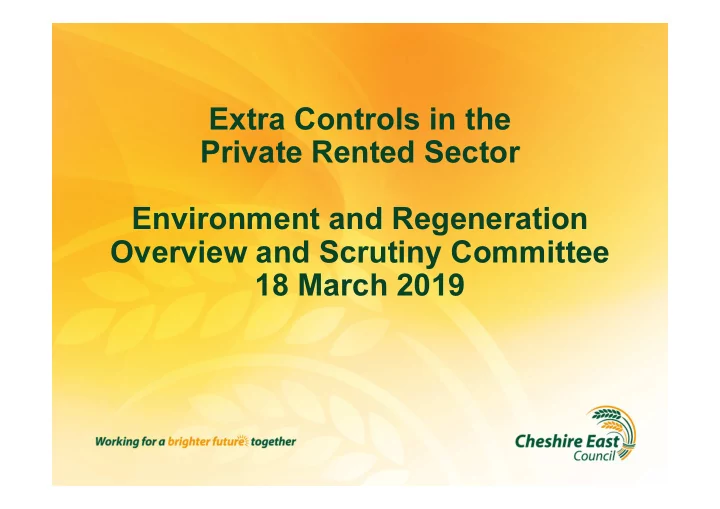

Extra Controls in the Private Rented Sector Environment and Regeneration Overview and Scrutiny Committee Overview and Scrutiny Committee 18 March 2019
Background • Strategic Housing work plan – “Examine the evidence base for extra controls in the private rented sector” • Members’ concerns: – Effect on communities and neighbourhoods – Poor housing conditions and overcrowding – Exploitation of tenants – Waste and fly tipping • Calls for greater regulation of HMOs / compulsory landlord registration scheme • This presentation provides an update on work which have been completed against the agreed actions
Actions previously agreed (HMO’s)
Extension to Mandatory Licensing of HMOs • Legislation changes took effect on 1 st October 2018 • An entire house or flat which is let to 5 or more tenants who form 2 or more households and who share facilities – this is a HMO that will require a licence, regardless of how many storeys the property is set out over – Minimum room sizes introduced – Licence holders will be required to comply with LA schemes for waste management
Mandatory Licensing of HMOs - update • Recruitment – 2fte HMO Compliance Officers • Communication Plan – Report a HMO, Online HMO Register, Press releases, Social Media, Mailings, Presentations and face to face meetings (press cuttings) • New fee structure • Enforcement Policy with new stronger powers • DBS checks implemented • Up to 15 th August 2018 – 40 new applications • From 16 th August - 89 new applications • Current figures – 180 HMO Licences
Mandatory HMOs • Challenges – – Incomplete paperwork being sent through from applicants – Fear of GDPR – resistance to sharing tenancy agreements agreements – Informal management arrangements without formal contracts in place – ICT challenges
Mandatory HMOs • Positives: – Good standards of accommodation – Provides a level playing field for landlords in the HMO market – Opportunity to stipulate and enforce maximum occupancy – Positive engagement with landlords and agents – building relationships – Compulsory property inspections
Mandatory HMOs Next steps: • Staffing – looking at ways to expand the service • Enforcement action against unlicensed HMOs • Management Orders – exploring options • Continue our inspection programme for the properties that don’t require a licence • Review the case for Additional Licensing Scheme for other HMOs
Actions (2) Recommendation to give further consideration to an Article 4 Direction to remove permitted development rights in respect of HMOs through the collation of evidence in relation to specific, identified areas.
HMOs and Planning Dwelling house (planning use class C3) ‘small’ HMO (planning use class C4) …..is ‘permitted development’ Dwelling house (planning use class C3) ‘large’ HMO (‘sui generis use’) …..requires planning permission from the local planning authority Definitions: ‘small’ HMO = between 3 and 6 unrelated individuals who share basic amenities ‘large’ HMO = more than 6 unrelated individuals who share basic amenities ‘sui generis use’ = a use falling outside any planning use class
• Permitted development rights can be removed through an Article 4 Direction (A4D) across a defined area, so that an express planning permission is required from the local planning authority for the development of all HMOs, regardless of the size of the property • A4Ds must be strongly justified as they take away a national grant of planning permission • They should be limited to situations where such action is necessary to protect local amenity or the well-being of an area. • The potential harm that a direction is intended to address should be clearly identified.
A4D considerations • There is an overlap between the evidence required to justify the introduction of selective licensing and putting in place an A4D – both extend into local amenity and well-being issues • However, an Article 4 Direction will not address any local amenity issues that exist, even if it was evidenced that these are directly linked to HMOs in the area • The effect of an A4D is limited to requiring a planning application to be made to the LPA for any new, additional HMOs in the designated area. • The case for an A4D needs to be considered in the context of the Council’s potential introduction of selective licencing. If there is sufficient evidence for selective licencing and it is introduced, it should impact positively on the standard of private rented homes and how they are managed, including those HMOs that currently fall outside of the licensing regime. • The impact of selective licencing would need to be monitored to understand whether it is effectively addressing the local amenity issues that warranted its introduction. • The absence of evidence to justify selective licencing may similarly indicate a difficulty in justifying an A4D.
Selective Licensing “compulsory landlord registration scheme” • Area with a high proportion of private rented housing (>19%), and one or more of the following: – Low housing demand – Significant and persistent anti social behaviour – Poor property conditions – Poor property conditions – High levels of migration / deprivation / crime • Borough-wide scheme not suitable due to proportion of private rented housing (17.7%, BRE 2019) • Merit in considering localised schemes in Crewe Central / Crewe South – further in depth analysis required
Actions (3)
Selective Licensing - Update • Commissioned an evidence base for housing conditions – Housing Stock Model (BRE) - Work to be completed Spring 2019 Next Steps: • • Re-examine and update other categories of evidence Re-examine and update other categories of evidence required – cross reference with evidence base from BRE to form a full picture • Consider what issues we are seeking to address – alternative strategies to tackle the issues – is selective licensing the most appropriate mechanism? • Decision on whether a Selective Licensing scheme should be consulted on (Cabinet decision)
QUESTIONS?
Recommend
More recommend